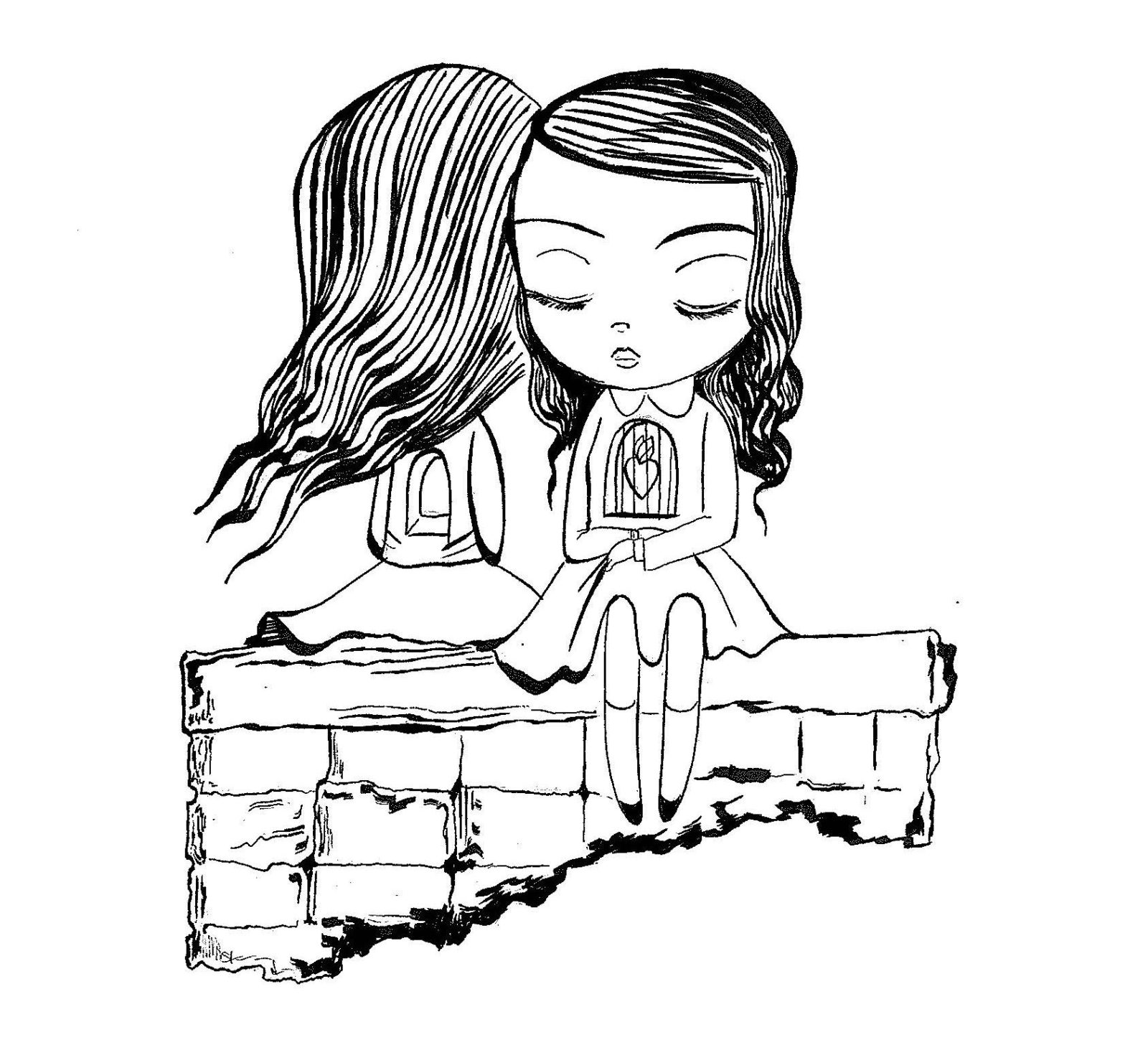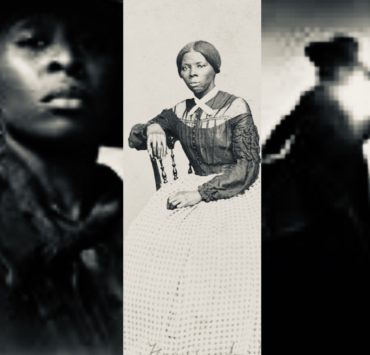
Luz always cried. Paz never did but could make others cry just by looking at them. The twin sisters grew up together, a paradox of paroxysms, in a small house with their blind grandmother, Doña Inez, an ancient woman with skin like a pecan heart, golden brown rivulets like the lines on the map of the world.
Luz could perceive the sorrows, shallow or deep, of any person and some animals and lament in loud, open wails, or tight, private, choking sobs. Once, she passed an old man on the street. Stooped over, his gait drunken and serpentine, he was a picture of desperate dignity, but moved her to spasms of tears. The old man wheezed with laugher and shook his head.
Paz could make people feel pain just by looking at them. “Duele donde mira,” the people would say, meeting her gaze, wincing at the sight of her, doubling over, grabbing at their chests to loosen the tightness there, or clutching at their throats, or covering their eyes with their trembling hands. Crows fell from the sky landing with a thud at her feet after she focused on the tiny ball bearings of their eyes or admired the blueness of their black feathers. They shook off the stupor, walking sideways on spindly, twig feet. Cats yowled as if their tails were stepped on repeatedly.
Luz had always wanted a dog and found one once, a small brown, matted terrier she named Chispa. When Paz saw him, she petted him while she turned her face up to the sky to stop the eruptions of howls that came from his panting wet mouth whenever she looked into the dark eyes that drew her in to his soft, scared face. The dog whimpered, but kept wagging his tail. It was Luz’s loud crying that scared him off when she was moved by the pup’s act of compromise.
The girls never knew their father and their mother, Ana, died soon after childbirth. The partera informed Doña Inez of the milk leg, the “pierna de leche” that made her daughter’s leg swell. It was a common enough malady among the poor mothers in Panyagua. There was no doctor in the town. This case, according to the partera and the curandera, was like nothing they had ever seen before—a leg ballooned to four times its size and covered in ulcers.
Doña Inez considered her daughter’s untimely death a tender mercy. She was left to raise the girls, even with her failing eyesight.
They lived in a small house on the edge of Panyagua. It fronted the river that divided their small town with one on the other side known as Sinsueños.
From the bluff where their house stood on the edge of Panyagua, children bobbed and swam in the river. Women washed clothes, and men cast their lines for small greenish fish. Luz watched from the window sniffing back her tears and licking the saltiness of the mocos that ran into her mouth. Paz sat on the damp ground among the families wearing a big blue pañuelo over her head to cover her face. She pulled up the edge of the rag to see how big the latest catch was on the end of the fishing line of one of the men. She moved closer, catching the eye of the fish that looked at her sidewise. It bucked and fought so mightily, it snagged the line and jumped back into the murky green water of the river.
At the school, the teacher put the girls in a corner in the back of the class. Luz cried every time she saw Maestra Cleotilde and perceived her loneliness and her unquenchable thirst for a clear liquid that made her feel warm and dizzy. The teacher’s breath was sour, and Luz could smell it when the teacher sighed about Paz. “Keep that rag on your head,” Maestra Cleotilde instructed Paz. “We don’t want to see you! And you!” to Luz, “Stop that crying, María Magdalena!” Luz cried all the more because she knew her maestra was sad herself and spent her nights weeping into her pillow because she was a lonely spinster.
The girls were not allowed to look at the only book in the school room. It was a picture book about animals with a warped cover and brittle, wavy pages. The single time Luz and Paz were allowed to handle the book, Luz’s tears drenched it to a soggy pulp. They had to leave it outside in the sun to dry to its faded, crisped condition. Maestra Cleotilde would now allow the girls to handle only a single pencil and a sheet of paper to share, and they sat in the dark corner for the whole day while the other children learned the alphabet and their numbers. The sisters could hear what they said and practiced together as best they could. Luz’s tears would fall on the paper, dissolving away what they had scribbled there and making it impossible to write on without tearing it with the point of the pencil.
The children were told not to look at Paz. Luz was told not to look at the other children for fear that the fount of endless tears would distract them from their lessons. Sometimes, when Luz looked askance at the children, the tears came unbidden. Most of the children had not eaten breakfast and their thoughts of the hollows in their stomachs brought forth wails from Luz that shook the windows of the room.
One day, when a gang of wild boys approached Luz while she stood outside the school, she cried hard and inconsolably, perceiving the rough homes of the boys. She saw in full bloom in her mind the sorrows of each. This one was fatherless, this one’s mother on drugs, this one had confusing feelings about the other boys. This one was chubby and felt self-conscious. This one was skeletal no matter what he ate. The gang of wild boys laughed at her, thinking at first that they had succeeded in scaring her. “How much money do you have?” the fatherless one asked.
“I only have six pesos,” she said, “but I am saving this for a book of my own I want to buy.” The boys all laughed.
“Where are you gonna buy a book here in Panyagua?” asked one. He pulled out a knife and went to grab Luz’s arm as she pushed her fist into the pocket of her dress. As he did so, Paz approached.
“Sister! Don’t give them our pesos!” The boys turned to see Paz standing there, the pañuelo around her neck, her face exposed.
The fatherless boy fell over, his hands pressed hard against his closed eyes to give them an extra cover against what he had just seen.
“Sister!” said Luz, her mouth contorted, the tears soaking the front of her dress, “Cover your face!”
The chubby boy fell to his knees and vomited thick greenish curds. The skeletal boy rolled around in what the other threw up and howled, pounding the sidewalk with his fists. They staggered to their feet and joined the other boys, all of them running away screaming.
Luz pulled the pesos out of her pocket and waved her fist in the air offering it to anyone who would take it from her if it meant the cries and screams would stop. Paz pulled her sister’s arm down and told her to be quiet. “Sister, we cannot stay here,” she said, the blue handkerchief now on her head shielding the top part of her face. “These boys will return and you will always cry when you see them and the sadness they cannot keep from your eyes, even with their daggers.”
Maestra Cleotilde emerged from the door of the school. “Niñas, you cause so much trouble. And there is no one here to help you. I wish you would go away from here.” She pointed to the top of her head and Paz patted the blue rag in place. Luz cried.
When the girls went to Doña Inez with the idea that they should follow what Maestra Cleotilde said and perhaps travel to Sinsueños, she agreed. She said that in Sinsueños they could find a school or a hospital where they could get help for their odd maladies. Luz stared into her abuela’s blind eyes, blued and cloudy. She could not perceive any emotion in the old woman, any feeling of sorrow or fretting. She could only sense a kind of muted hope. She sniffed and wiped her eyes.
“You must go there,” said Doña Inez, her murky eyes staring past the girls. Luz blew her nose with the hem of her pinafore. “I have tried everything to help you, girls. Now you must go. There are many people there who came from someplace else, from across this river and oceans and the sky. Many people. They will know exactly how to help you. You must go now.”
Luz considered her words. “It must be true. If everyone has daddies and pesos and books why would I ever cry there? Who could I ever see that would make me feel sad?”
Paz shrugged. “Maybe only me,” she said. “Maybe I will be the only one in Sinsueños that you will feel sorry for?”
“Why you?” asked Luz. “If we go there together, we will always be happy because we will have pesos and books and each other.”
The girls set out the next day on a lancha that looked like a large floating bed. They borrowed it from a fisherman’s wife who took one peso from Luz, leaving her with five for the journey. They floated along in the gloom of a gray afternoon, drifting this way and that and landing on the other side of the river. It took minutes. When they were close enough to the bluff, they portaged the tiny craft and hid it in the thick impenetrable carrizo and the wild, grotesque mesquite trees that shadowed the entry of this new town.
Three uniformed people emerged from behind the thinnest part of the wall of trees and tall weeds. One yanked back the leash of a skinny, wild-eyed dog that growled and bared its yellow fangs.
“Stop!” yelled one of the officers. It was a woman with a stomach like a large drum and dyed yellow hair like straw. She wore sunglasses that made her look blind. Her heavy make-up made her skin look orange. “You there!” she screamed at Paz. “Take that hat off!”
“You mean this?” asked Paz. “This is not really a hat. It’s just a rag to cover my face.” The lady officer pulled out her gun and shot it into the air. Startled, Luz pulled down Paz’s rag, exposing her face to everyone. The wild-eyed, skinny dog pulled on the leash and ran away and cowered under the shade of a cypress tree. One officer fainted. One lost his balance and leaned against the fat lady officer.
Luz cried, not because she perceived emotion in the officers, but because she saw nothing at all, no emotions. The fat lady was thinking about hamburgers. The other officer was thinking about kissing the fat lady’s orange face.
They took the girls into a large white building that smelled like the inside of an armpit. They saw nothing but children in grey clothing sitting in cages. Other officers banged on the cages with their open hands. “Stop crying!” they would yell as they passed each one, never looking inside the cages at the children holding their tiny arms up, calling for their mami.
By now the officers had forced Paz to wear a paper bag over her head to cover her face. They threw her into a cage and instructed her not to remove the bag. The fat lady told Luz to remove the pinafore and put on the gray uniform and then she put her hand into the pocket of the pinafore and removed the five pesos. She pushed them into the slit of her own pocket with the smallest finger of her tiny hand, all that she could squeeze into the tight pants, her long red tie hanging over the large barrel of her stomach.
Walking toward the cages, Luz looked around at the hundreds of children. All of them cried. 2000 children cried at the same time. The sound of it, and the explosion of their collective sorrows she perceived at that moment were so overwhelming, that her sadness turned to a rage that she felt for the first time in her life. It was an odd feeling—the anger and also feeling of a power or a will to suppress it at the same time. It made her feel even more exhausted than when she cried all day long.
The children cried while they slept, a winsome sound like doves cooing.
Luz spotted Paz’s cage and saw her sister lying on the ground with the bag over her head. “Did that music make you go mi-mi, Sister? Did the children’s song make you go to sleep?” Paz did not move. She did not say anything.
Luz tried to put her arms through the slim bars of Paz’s cage “Sister? Sister? Wake up, Sister! My sister! Help my sister!” Luz called out into the air. A guard approached with the wild dog.
The fat officer with the orange face entered Paz’s cage “What’s wrong with her?” She kicked at Paz’s feet.
Another guard pulled the bag from her head. He stumbled backwards, knocking the fat orange-faced woman to the ground. All the guards ran to the cage. Dozens of them gasped and exclaimed at the sight of Paz’s beauty. Many of them wept and cried out, “She is so beautiful! She is the most beautiful girl I have ever seen!”
They huddled around the girl and tried to rouse her, but it was too late.
When they turned around, Luz was gone.
The lancha was where they had left it. Luz pushed and grunted and slid it back into the water. The brown matted terrier swam toward her, paddling rhythmically. She helped it onto the boat.
The dog wagged his tail. Luz, her face streaked with salt, covered her head with her sister’s blue rag, stuck her pole into the water to propel the small boat, and stared straight ahead, toward the horizon, away from Sinsueños, away, too, from Panyagua. They floated along the greenish gloaming. A silver sky opened before her, a passage free for anyone.
Art by Hector Garza

Yvette Benavides is a professor of English and creative writing at Our Lady of the Lake University in San Antonio, Texas. She is a book critic for the San Antonio Express News and a contributor on Texas Public Radio.







